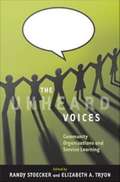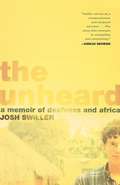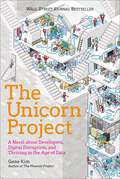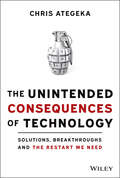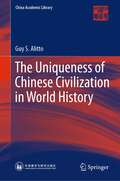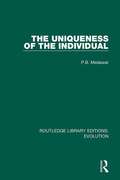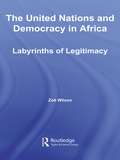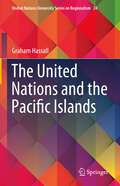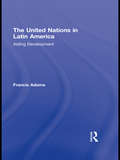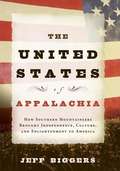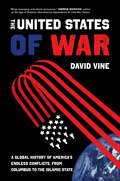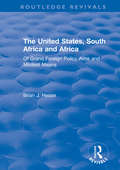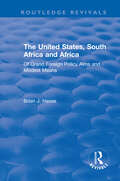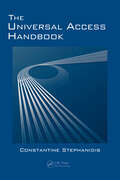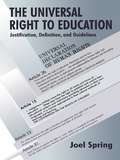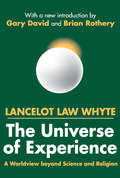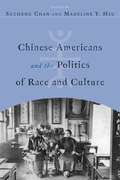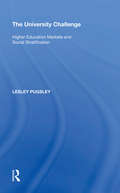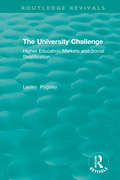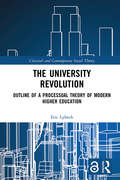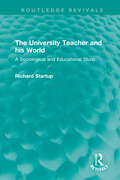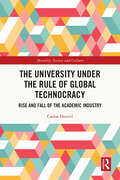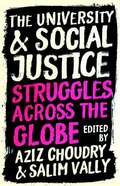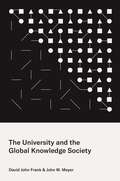- Table View
- List View
The Unheard Voices: Community Organizations and Service Learning
by Randy Stoecker Amy Hilgendorf Elizabeth TryonService learning has become an institutionalized practice in higher education. Students are sent out to disadvantaged communities to paint, tutor, feed, and help organize communities. But while the students gain from their experiences, the contributors toThe Unheard Voicesask, "Does the Community?" This volume explores the impact of service learning on a community, and considers the unequal relationship between the community and the academy. Using eye-opening interviews with community-organization staff members,The Unheard Voiceschallenges assumptions about the effectiveness of service learning. Chapters offer strong critiques of service learning practices from the lack of adequate training and supervision, to problems of communication and issues of diversity. The book's conclusion offers ways to improve service learning so that future endeavors can be better at meeting the needs of the communities and the students who work in them.
The Unheard: A Memoir of Deafness and Africa
by Josh SwillerSwiller spent his early years in frustrated limbo on the sidelines of the hearing world. So he decided to abandon the well-trodden path after college, setting out to find a place so far removed that his deafness would become irrelevant.
The Unicorn Project: A Novel about Developers, Digital Disruption, and Thriving in the Age of Data (The Phoenix Project)
by Gene KimThe Phoenix Project wowed over a half-million readers. Now comes the Wall Street Journal Bestselling Wall Street Journal bestselling The Unicorn Project!&“The Unicorn Project is amazing, and I loved it 100 times more than The Phoenix Project…&”—FERNANDO CORNAGO, Senior Director Platform Engineering, Adidas&“Gene Kim does a masterful job of showing how … the efforts of many create lasting business advantages for all.&”—DR. STEVEN SPEAR, author of The High-Velocity Edge, Sr. Lecturer at MIT, and principal of HVE LLC.&“The Unicorn Project is so clever, so good, so crazy enlightening!&”––CORNELIA DAVIS, Vice President Of Technology at Pivotal Software, Inc., Author of Cloud Native PatternsThis highly anticipated follow-up to the bestselling title The Phoenix Project takes another look at Parts Unlimited, this time from the perspective of software development.In The Unicorn Project, we follow Maxine, a senior lead developer and architect, as she is exiled to the Phoenix Project, to the horror of her friends and colleagues, as punishment for contributing to a payroll outage. She tries to survive in what feels like a heartless and uncaring bureaucracy and to work within a system where no one can get anything done without endless committees, paperwork, and approvals.One day, she is approached by a ragtag bunch of misfits who say they want to overthrow the existing order, to liberate developers, to bring joy back to technology work, and to enable the business to win in a time of digital disruption. To her surprise, she finds herself drawn ever further into this movement, eventually becoming one of the leaders of the Rebellion, which puts her in the crosshairs of some familiar and very dangerous enemies.The Age of Software is here, and another mass extinction event looms—this is a story about rebel developers and business leaders working together, racing against time to innovate, survive, and thrive in a time of unprecedented uncertainty...and opportunity.&“The Unicorn Project provides insanely useful insights on how to improve your technology business.&”—DOMINICA DEGRANDIS, author of Making Work Visible and Director of Digital Transformation at Tasktop———&“My goal in writing The Unicorn Project was to explore and reveal the necessary but invisible structures required to make developers (and all engineers) productive, and reveal the devastating effects of technical debt and complexity. I hope this book can create common ground for technology and business leaders to leave the past behind, and co-create a better future together.&”—Gene Kim, November 2019
The Unintended Consequences of Technology: Solutions, Breakthroughs, and the Restart We Need
by Chris AtegekaDiscover the technologies and trends that threaten humanity and our planet--- and how we can rein them back in, together In The Unintended Consequences of Technology: Solutions, Breakthroughs and the Restart We Need, accomplished tech entrepreneur Chris Ategeka delivers an insightful and eye-opening exploration of the challenges and the opportunities at the intersection of technology, society and our planet. Detailing both positive and negative technology use cases that on one hand have made humanity better, but on the other hand pose a serious threat to individuals and groups across the world, the author demonstrates how to avoid allowing powerful technologies to overcome our better natures. In this book, you'll: Discover how the forces of capitalism, greed and the myths that surround meritocracy when combined with exponential technology pose an existential risk for humanity. Explore the many exponential technologies such as gene editing, 5G, behavior modification, cyberspace… that have lots of promise but also uncertainty. Consider the future of humanity we wish to collectively build, and whether we can rebuild a capacity for empathy at scale in our tech tools Perfect for founders, business leaders, executives, managers, Chief Technology Officers, and anyone else [i.e. all human beings] responsible for the use and proliferation of advanced technologies. The Unintended Consequences of Technology is a thought-provoking, must-read resource for those at the forefront of our new technological reality.
The Unintended Reformation: How a Religious Revolution Secularized Society
by Brad S. GregoryIn a work that is as much about the present as the past, Brad Gregory identifies the unintended consequences of the Protestant Reformation and traces the way it shaped the modern condition over the course of the following five centuries. A hyperpluralism of religious and secular beliefs, an absence of any substantive common good, the triumph of capitalism and its driver, consumerism—all these, Gregory argues, were long-term effects of a movement that marked the end of more than a millennium during which Christianity provided a framework for shared intellectual, social, and moral life in the West. Before the Protestant Reformation, Western Christianity was an institutionalized worldview laden with expectations of security for earthly societies and hopes of eternal salvation for individuals. The Reformation’s protagonists sought to advance the realization of this vision, not disrupt it. But a complex web of rejections, retentions, and transformations of medieval Christianity gradually replaced the religious fabric that bound societies together in the West. Today, what we are left with are fragments: intellectual disagreements that splinter into ever finer fractals of specialized discourse; a notion that modern science—as the source of all truth—necessarily undermines religious belief; a pervasive resort to a therapeutic vision of religion; a set of smuggled moral values with which we try to fertilize a sterile liberalism; and the institutionalized assumption that only secular universities can pursue knowledge. The Unintended Reformation asks what propelled the West into this trajectory of pluralism and polarization, and finds answers deep in our medieval Christian past.
The Uniqueness of Chinese Civilization in World History (China Academic Library)
by Guy S. AlittoThe book is a meticulous work in answering these questions which often occur to foreigners as well as modern Chinese themselves at the thought of the old China and its experience in modern times: What is Chinese civilization? How could it exist for several millennia and spread that far? Is there anything inherent in this civilization?From the standpoint of an “outsider” to this civilization, the author incorporates various elements, such as geographic factors, language, thoughts, with the recurrent themes along the two thousand years and changes throughout, rather than simply following a lineal progression. His historiographical approach, the methodology of eclectic common sense, as he termed it, is a new try in this field and will present a brand new perspective for both readers and researchers in that field.
The Uniqueness of the Individual (Routledge Library Editions: Evolution #8)
by P.B. MedawarOriginally published in 1957, The Uniqueness of the Individual is a collection of 9 essays published from the ten years preceding publication. The essays deal with some of the central problems of biology. These are among the questions put and answered from the standpoint of modern experimental biology. What is ageing and how is it measured? What theories have been held to account for it, and with what success? Did ageing evolve, and if so how? Is Lamarckism and adequate explanation of evolutionary process? Does evolution sometimes go wrong? Do human beings evolve in a way peculiar to themselves? Other essays touch upon the problems of scientific method and of growth and transformation. This book will be of interest to natural historians, evolutionists and anthropologists.
The United Nations and Democracy in Africa: Labyrinths of Legitimacy (Studies in International Relations)
by Zoë WilsonThis book explores UN bureaucracy and the development dysfunction it sows in four 'most different' African countries: Angola, Botswana, Namibia, and Tanzania. Wilson's original purpose for researching this book was to uncover new solutions to some of the United Nations' most vexing implementation problems. Yet, as research unfolded, it became clear that the reasons for those problems lay tangled up in bureaucratic and philosophical quagmires of a much more fundamental nature. The United Nations and Democracy in Africa is the documentation not only of these bureaucratic and philosophical absurdities that find expression through development practice, but also the journey of the author from ardent defender of the UN to profound sceptic.
The United Nations and the Pacific Islands (United Nations University Series on Regionalism #24)
by Graham HassallThis book critically examines the relationship between the United Nations Organization and the small states of the Pacific islands. It provides an in-depth coverage of the United Nations, coupled with how Pacific Small Island Developing States interact. It covers three themes, the first one being the position of the UN on the Pacific Islands, which examines the role of the many UN organs, agencies and programs in strengthening individual countries and the region as a whole. It examines the manner in which the UN’s activities have benefited Pacific nations, territories and peoples. The second theme deals with the Pacific states in the UN, and examines the participation of Pacific nations and territories in the UN’s various organs, agencies, and programmes. It analyses the contribution they have made to the effectiveness of the organization, as distinct from the benefits they have sought to gain from it. The third and last theme deals with small states in global public policy, taking a broader look at how small states are faring within the UN system in the age of global discourse on shared public goods/public policy concerns.
The United Nations in Latin America: Aiding Development (Routledge Studies in Latin American Politics)
by Francis AdamsThe United Nations has increased its worldwide efforts to promote sustainable development. In this book, noted scholar Francis Adams examines the United Nations' actions in Latin America, particularly in light of meeting basic human needs, promoting gender equity, and preserving natural environments. While previous books have focused on a single UN agency, this book is the first to analyze the development work of various UN institutions and agencies that sponsor economic and social programs in the developing world as well as the UN's various funding initiatives, global conferences, and institutional goals. This book will be a necessary addition for students and scholars of Latin American politics and Development.
The United States Of Appalachia
by Jeff BiggersThe word Appalachia is seldom uttered in the same sentence with the word enlightenment. More likely, images of the film Deliverance, corncob chomping grannies, or bonafide gun-toting hillbillies come to mind. However, in truth, Appalachia has been a cradle of US freedom, independence, and enlightenment, as well as a region of progressive social history, literature, and music. The United States of Appalachia reveals to us how so many of our nation's basic freedoms and founding moments grew out of the Appalachias. From the first declaration of independence to the beginnings of folk music, literature, and poetry, Jeff Biggers illuminates with humor, intelligence, and clarity, the many reasons why we all need a lesson in Appalachian history.
The United States of War: A Global History of America's Endless Conflicts, from Columbus to the Islamic State (California Series in Public Anthropology #48)
by David VineThe United States has been fighting wars constantly since invading Afghanistan in 2001. This nonstop warfare is far less exceptional than it might seem: the United States has been at war or has invaded other countries almost every year since independence. In The United States of War, David Vine traces this pattern of bloody conflict from Columbus’s 1494 arrival in Guantanamo Bay through the 250-year expansion of a global US empire. Drawing on historical and firsthand anthropological research in fourteen countries and territories, The United States of War demonstrates how US leaders across generations have locked the United States in a self-perpetuating system of permanent war by constructing the world’s largest-ever collection of foreign military bases—a global matrix that has made offensive interventionist wars more likely. Beyond exposing the profit-making desires, political interests, racism, and toxic masculinity underlying the country’s relationship to war and empire, The United States of War shows how the long history of U.S. military expansion shapes our daily lives, from today’s multi-trillion–dollar wars to the pervasiveness of violence and militarism in everyday U.S. life. The book concludes by confronting the catastrophic toll of American wars—which have left millions dead, wounded, and displaced—while offering proposals for how we can end the fighting.
The United States, South Africa and Africa: Of Grand Foreign Policy Aims and Modest Means
by Brian J. HesseThis title was first published in 2001. "Grand aims" refers to the overarching tenets and doctrines that prevailed in US and South African foreign policies towards Africa. This study argues that when modest means were imposed upon American and South African foreign policy-makers, they were often forced to devise new grand aims. Few in-depth resources exist with regard to United States and/or South African foreign policies towards Africa. Those that do are overwhelmingly pre- or early-1990s in focus. This analysis encompasses the years 1990 to mid-1998 and is intended to be relevant to a broad readership, including academics, students, Africanists, historians, political scientists, regional specialists and policy-makers in the public and private sectors on both sides of the Atlantic.
The United States, South Africa and Africa: Of Grand Foreign Policy Aims and Modest Means (Routledge Revivals)
by Brian J. HesseThis title was first published in 2001. "Grand aims" refers to the overarching tenets and doctrines that prevailed in US and South African foreign policies towards Africa. This study argues that when modest means were imposed upon American and South African foreign policy-makers, they were often forced to devise new grand aims. Few in-depth resources exist with regard to United States and/or South African foreign policies towards Africa. Those that do are overwhelmingly pre- or early-1990s in focus. This analysis encompasses the years 1990 to mid-1998 and is intended to be relevant to a broad readership, including academics, students, Africanists, historians, political scientists, regional specialists and policy-makers in the public and private sectors on both sides of the Atlantic.
The Universal Access Handbook (Human Factors and Ergonomics)
by Constantine StephanidisIn recent years, the field of Universal Access has made significant progress in consolidating theoretical approaches, scientific methods and technologies, as well as in exploring new application domains. Increasingly, professionals in this rapidly maturing area require a comprehensive and multidisciplinary resource that addresses current principles
The Universal Right to Education: Justification, Definition, and Guidelines (Sociocultural, Political, and Historical Studies in Education)
by Joel SpringIn this book, Joel Spring offers a powerful and closely reasoned justification and definition for the universal right to education--applicable to all cultures--as provided for in Article 26 of the United Nation's Universal Declaration of Human Rights. One sixth of the world's population, nearly 855 million people, are functionally illiterate, and 130 million children in developing countries are without access to basic education. Spring argues that in our crowded global economy, educational deprivation has dire consequences for human welfare. Such deprivation diminishes political power. Education is essential for providing citizens with the tools for resisting totalitarian and repressive governments and economic exploitation. What is to be done? The historically grounded, highly original analysis and proposals Spring sets forth in this book go a long way toward answering this urgent question. Spring first looks at the debates leading up to the Universal Declaration of Human Rights in 1948, to see how the various writers dealt with the issue of cultural differences. These discussions provide a framework for examining the problem of reconciling cultural differences with universal concepts. He next expands on the issue of education and cultural differences by proposing a justification for education that is applicable to indigenous peoples and minority cultures and languages. This justification is then applied to all people within the current global economy. Acknowledging that the right to an education is inseparable from children's rights, he uses the concept of a universal right to education to justify children's rights, and, in turn, applies his definition of children's liberty rights to the concept of education. His synthesis of cultural, language, and children's rights provides the basis for a universal justification and definition for the right to education -- which, in the concluding chapters, Spring uses to propose universal guidelines for human rights education, and instruction in literacy, numeracy, cultural centeredness, and moral economy.
The Universe of Experience: A Worldview Beyond Science and Religion
by Lancelot WhyteModern experience forces philosophy and social thought to confront the basic problems of value. Is this life worth caring about? How can we find a way between the deceit of fanatical belief and despair? In the view of Lancelot Law Whyte, the essential challenge to mankind today is an underlying nihilism promoting violence and frustrating sane policies on major social issues. Avoiding the seductive trap of utopianism, Whyte approaches this challenge by defining the terms of a potentially worldwide consensus of heart, mind, and will.In this volume, Whyte addresses the problems of despair and fanatical religious or political reactions that arise from despair. He begins with the basic problem of nihilism, or the tendency toward pessimism and self/other destruction that faces us at this point in human development. Rejecting all forms of religious sectarianism as separating God from the individual and people from each other, he discerns, as well, a fundamental disunity and incompleteness among the sciences that render them incapable of supplying a guide to social order. Whyte sees the universe as an arena of conflict between tendencies toward order and disorder with the former dominating and containing the latter. In place of science and traditional religion, Whyte draws upon what he sees as the unconscious tradition, a genius of the community, shared in degrees by all its members, that points mankind toward a better way of living.Whyte does not posit a state of perfection, nor does he suggest the end of human suffering. Instead he suggests that an integrated state of being, freed from the old mind-body dualism will be a new starting point in human evolution. Accessibly written and firmly rooted in science, philosophy, and history, The Universe of Experience will be of interest to sociologists, psychologists, and philosophers.
The University Against Itself: The NYU Strike and the Future of the Academic Workplace
by Andrew Ross Mary Nolan Monika Krause Michael PalmThe essays in this book, written by people involved either involved in the strike (graduate students, faculty, organizers) or who are nationally recognized writers on academic labor, offers lessons on what the GSOC strike says about the current role of the university in public life, and how the pressure for universities to realign themselves along the lines of private corporations has broad implications for the future of higher education.
The University Challenge: Higher Education Markets and Social Stratification (Cardiff Papers In Qualitative Research)
by Lesley PugsleyIs the rhetoric of a 'free' market in higher education matched by the reality of choice? In her bench mark study of higher education markets and pupil choice, Lesley Pugsley demonstrates how policy initiatives to restructure higher education in the United Kingdom have been shaped by consumer ideologies and market principles. Based on qualitative data generated from some of the last cohort of students who entered higher education under the Robbins banner of 'free' education, Pugsley tracks groups of students from different schools as they engage in the process of selecting universities .This provides a vivid account of the ways in which students, their families and their schools engage with the choice process. It illustrates the significance and the impact of social class within a highly differentiated and increasingly market-orientated higher education sector and argues that for many young people the lack of class based competencies remain the real university challenge.
The University Challenge: Higher Education Markets and Social Stratification (Routledge Revivals)
by Pugsley LesleyPublished in 2004, this book discusses whether the rhetoric of the market in higher education is matched by the realities of choice. In the first comprehensive study of higher education markets and sixth form choice, Lesley Pugsley argues that the annual burst of media-fuelled panic about university entrance leads to a misinformed rhetoric about the purpose and value of higher education. This is a benchmark study based on the 1997 cohort of students, who were last to enter higher education under the ‘Robbins 1963’ banner of free education. Tracking a group of students throughout their sixth form careers, Pugsley provides a balanced account of the tensions experiences by the students, their parents and their teachers in an increasingly market-orientated higher education society. This book was originally published as part of the Cardiff Papers in Qualitative Research series edited by Paul Atkinson, Sara Delamont and Amanda Coffey. The series publishes original sociological research that reflects the tradition of qualitative and ethnographic inquiry developed at Cardiff. The series includes monographs reporting on empirical research, edited collections focussing on particular themes, and texts discussing methodological developments and issues.
The University Revolution: Outline of a Processual Theory of Modern Higher Education (Classical and Contemporary Social Theory)
by Eric LybeckFew institutions in modern society are as significant as universities, yet our historical and sociological understanding of the role of higher education has not been substantially updated for decades. By revisiting the emergence and transformation of higher education since 1800 using a novel processual approach, this book recognizes these developments as having been as central to constituting the modern world as the industrial and democratic revolutions. This new interpretation of the role of universities in contemporary society promises to re-orient our understanding of the importance of higher education in the past and future development of modern societies. It will therefore appeal to scholars of social science and history with interests in social history and social change, education, the professions and inequalities.
The University Teacher and his World: A Sociological and Educational Study (Routledge Revivals)
by Richard StartupOriginally published in 1979, the aim of this work was to analyse the occupational role of the university teacher, with the help of data collected within a specific university institution. This involves examining both what is expected of university teachers and what they actually do, and accounting for the patterns which their activities exhibit. Since the university teacher's occupation is multi-faceted it is necessary to examine several areas of activity including teaching, research and 'external' professional activities, as well as a number of types of relationships in which lecturers are involved. Data is presented and interpreted from interviews with the staff of four selected departments of a British provincial university (classics, pure mathematics, civil engineering and psychology) and also from questionnaire surveys of staff and students. Sociologically the university may be regarded as an organisation or institution, and the behaviour of its members understood through the notion of 'social role'. On the educational side of the study the central concern is with the teacher-pupil relationship. We are also confronted with a basic human problem of how employed people weave elements to give meaning to their working lives.
The University Under the Rule of Global Technocracy: Rise and Fall of the Academic Industry (Morality, Society and Culture)
by Carlos HoevelThis book explores the radical reform experienced by universities worldwide, as reformers, inspired by extreme economic thinking, seek to transform the university into part of a global academic industry. With attention to the implied passage from a focus on education and the advancement of knowledge, to an emphasis on the provision of human capital and economic benefits, the author describes the growing regulation of universities by the state, the substitution of academic government for business management and the implementation of quantitative measurement systems to replace the qualitative evaluation of teaching and research.Based on interview material collected among academics around the world, The University Under the Rule of Global Technocracy examines the deep causes and conceptual errors of this reformist project and offers a series of alternative proposals. It will therefore appeal to scholars of sociology, cultural studies and social policy with interests in higher education, the professions, and academic work and life.
The University and Social Justice: Struggles across the Globe
by Aziz Choudry and Salim VallyHigher education has long been contested terrain. From student movements to staff unions, the fight for accessible, critical, and quality public education has turned university campuses globally into sites of struggle. Whether calling for the decommodification or the decolonization of education, many of these struggles have attempted to draw on (and, in turn, resonate with) longer histories of popular resistance, broader social movements, and radical visions of a fairer world. In this critical collection, Aziz Choudry, Salim Vally, and a host of international contributors bring grounded, analytical accounts of diverse struggles relating to higher education into conversation with each other. Featuring contributions written by students and staff members on the frontline of struggles from 12 different countries, including Canada, Chile, France, India, Mexico, Nigeria, Occupied Palestine, the Philippines, South Africa, Turkey, the UK, and the US, the book asks what can be learned from these movements’ strategies, demands, and visions.
The University and the Global Knowledge Society (Princeton Studies In Cultural Sociology Ser.)
by David John Frank John W. MeyerHow the university went global and became the heart of the information ageThe university is experiencing an unprecedented level of success today, as more universities in more countries educate more students in more fields. At the same time, the university has become central to a knowledge society based on the belief that everyone can, through higher education, access universal truths and apply them in the name of progress. This book traces the university's rise over the past hundred years to become the cultural linchpin of contemporary society, revealing how the so-called ivory tower has become profoundly interlinked with almost every area of human endeavor.David John Frank and John Meyer describe how, as the university expanded, student and faculty bodies became larger, more diverse, and more empowered to turn knowledge into action. Their contributions to society underscored the public importance of scholarship, and as the cultural authority of universities grew they increased the scope of their research and teaching interests. As a result, the university has become the bedrock of today's information-based society, an institution that is now implicated in the solution to every conceivable problem.But, as Frank and Meyer also show, the conditions that helped spur the university's recent ascendance are not immutable: eruptions of nationalism, authoritarianism, and illiberalism undercut the university's universalistic and rationalistic premises, and may threaten the centrality of the university itself.
